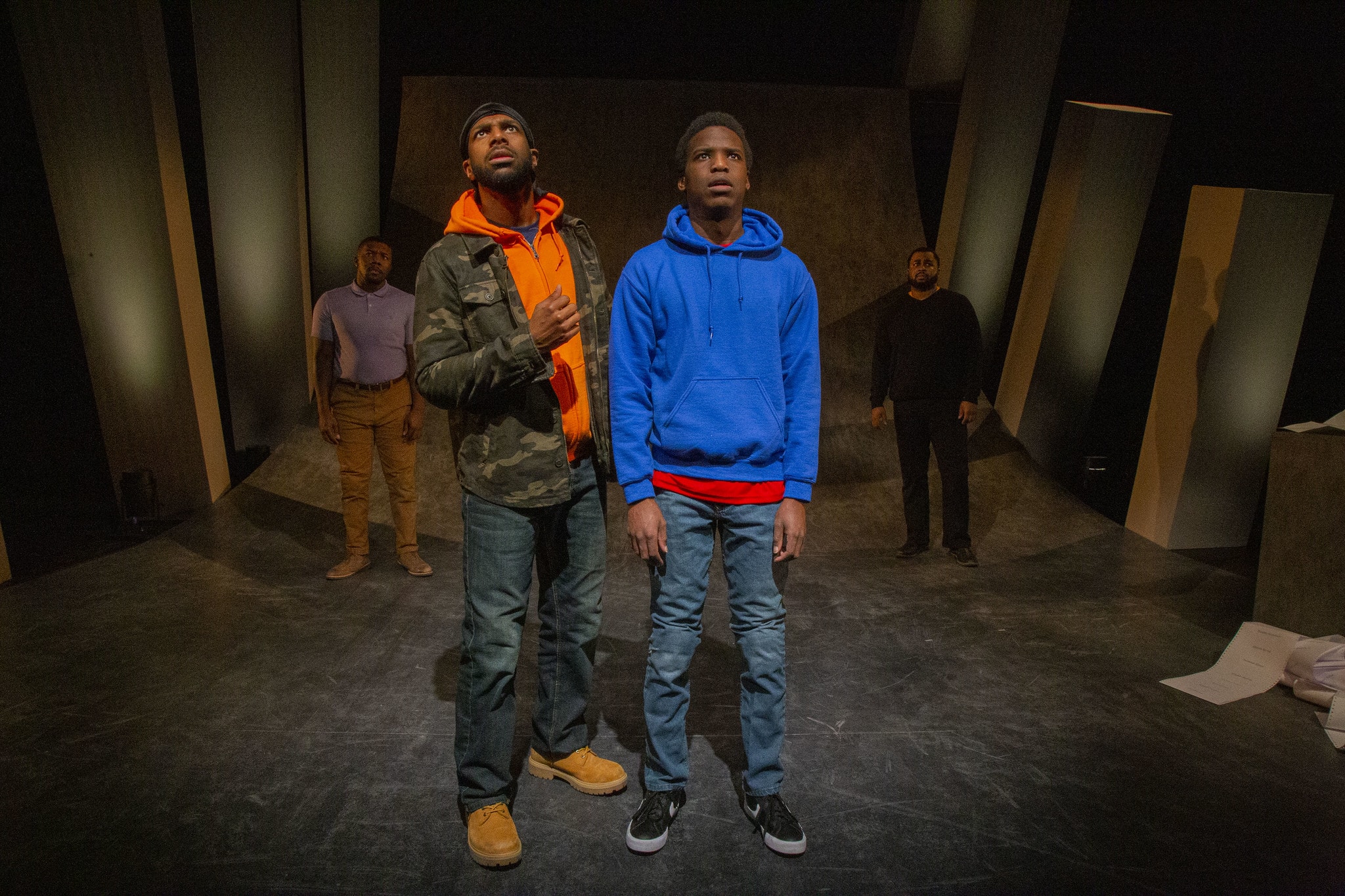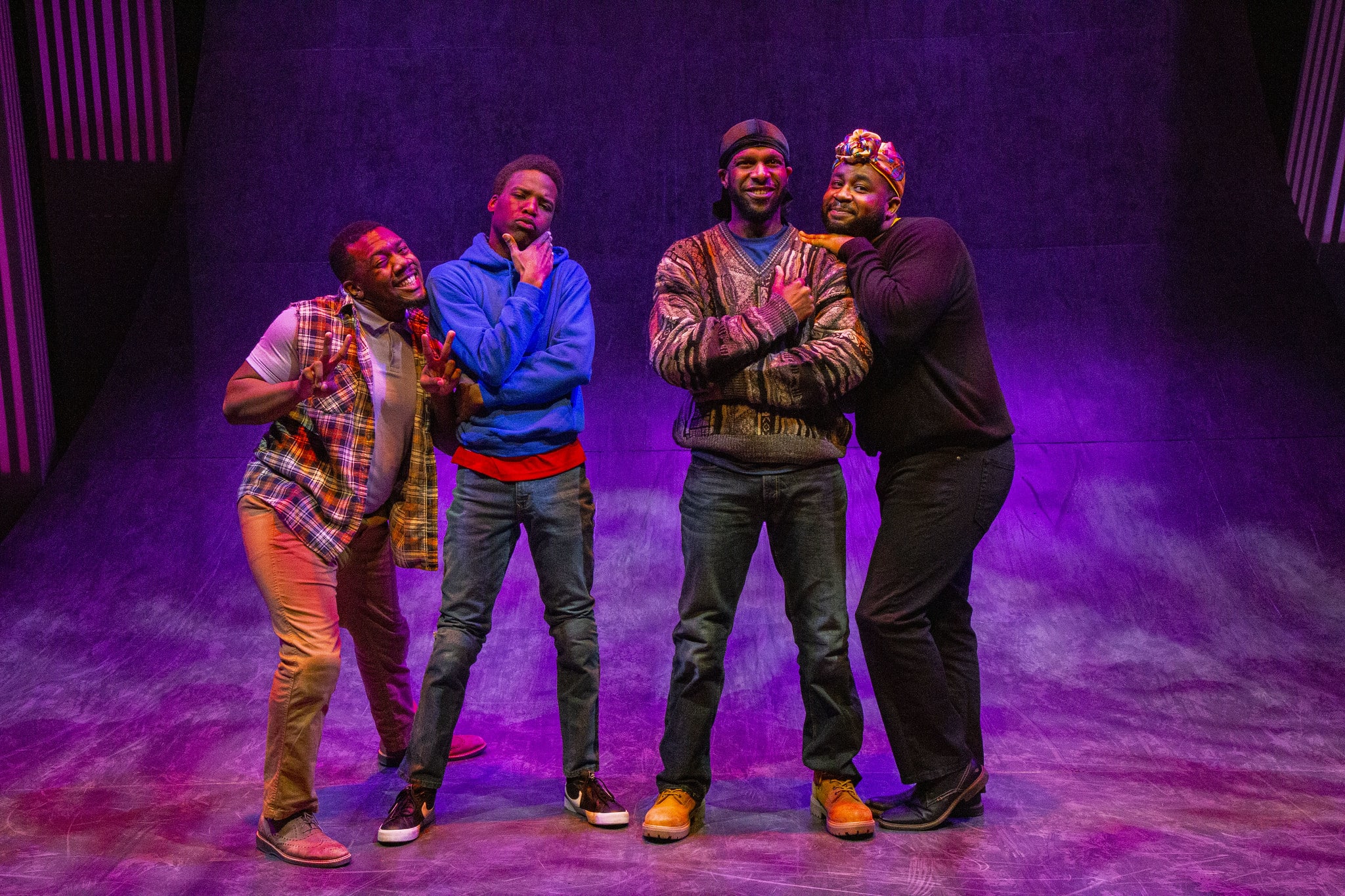Don’t let those off-putting promos for Kill Move Paradise at Rep Stage stop you from turning out for its solid regional premiere at Howard Community College. This 2016 piece of theater is less a soapbox diatribe on racial polarization than a bittersweet fantasy worthy of The Twilight Zone.

Yes, playwright James Ijames is addressing the street war on young black men in modern America. But his surreal drama soars over the head of identity politics, race or even run-ins with bad cops.
This fast-moving, 72-minute work takes us across the racial divide by dismantling cultural stereotypes and examining the misplaced fears that drive society apart. In short, Kill Move Paradise leads by example.
We watch as four young African-American males are literally dropped into some spiritual holding facility to await their “rightful place” in the cosmos. Even the idea of such a thing can be profoundly sad if you stop to think about it.
What makes the piece such an ideal choice for any campus theater is that it’s not just timely, it’s clearly in a line with such adored academic observers as Pirandello, Beckett, and Sartre.
But the playwright gives it all a post-modern tweak in his willingness to cross genres, drawing upon sitcom tropes, Soul Train moves, and frequent wordplay. At one point the men take a high-dive from the scary concept of facing their spiritual limbo into an impromptu “limbo pole” dance party. How low can you go?
The playful tone reminded me of another recent academic darling, Eric Overmyer’s On the Verge, or The Geography of Yearning. Stripping away the sociopolitical urgency, the two plays feature pilgrims facing their dilemma with a similar sense of detachment.

It’s not all fun and games, by any means. Audience members in the front row may feel themselves unfairly singled out for some finger-wagging from time to time.
The disturbing center of the play, though, is a roll call of the fallen. Real names from the news and many more not as familiar appear etched down the long, curved wall of the cyclorama like a memorial scroll. No matter what or who is behind this war, its victims can clearly be viewed as martyrs to their tragic time and place.
Director Danielle A. Drakes wrests life from the work with an experienced hand. As an actress herself, Drakes evoked over a dozen different souls on stage at Howard Community College in last year’s one-woman play Twilight: Los Angeles, 1992. Here she draws out the best of her four-person cast for a related story.
First on stage is Dylan J. Fleming as Isa, a stocky powder keg of a man with an impish grin and what turns out to be a short fuse. Next comes Jonathan Del Palmer as Grif, less prone to histrionics and with an athletic build that proves he is no passive plaything of fate.
Christian R. Gibbs plays Daz, a streetwise hustler with an easy smile who is not used to waiting for what he wants. And finally, there is Tendo Nsubuga as “Tiny,” not much more than a schoolboy and happy to still believe in action heroes and mother’s cooking.
All of these Equity actors and candidates prove their investment in the material by never shying away from looking goofy or vulnerable on stage. They coalesce around the idea of breaking through barriers (even if it’s theater’s fabled fourth wall) with mockery and humor, dabs of sentiment, and even hopeless rage when required.
The gods of the stage are in harmony on this one. Scenic Designer Debra Kim Sivigny comes up with a visual metaphor that conjures the impersonality of skyscrapers and inner-city concrete laid improbably on a cloud.
Lighting Designer Harold F. Burgess II and Sound Designer Kevin L. Alexander summon up impressive thunder and lightning effects that never fail to remind us of the primal force that is live theater.
Free post-show discussions will take place on February 28 and March 6, with one special pre-show lecture prior to the 2 p.m. show on March 7.
Running Time: About 75 minutes with no intermission.
Kill Move Paradise plays at Rep Stage through March 8, 2020, in the Studio Theatre of the Horowitz Visual and Performing Arts Center at Howard Community College — 10901 Little Patuxent Parkway, in Columbia, MD. Order tickets here.




